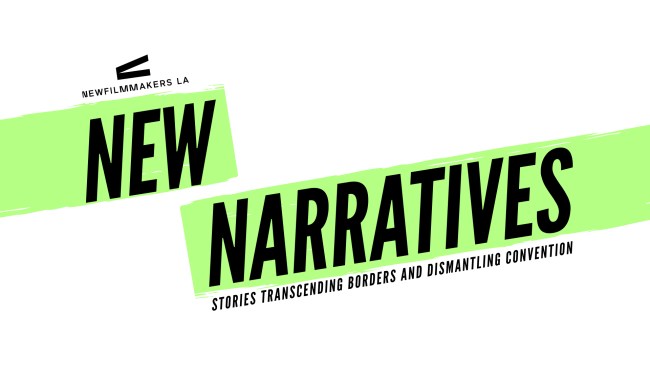Any film, TV, or streaming project, at any stage: That’s what NewFilmmakers LA is backing with four $5,000 grants through its NewNarratives Content Program — plus a fifth $5,000 grant specifically for post-production on a short film focused on environmental issues. Submissions are now open, with an August 5 deadline.
Now in its 18th year, NewFilmmakers LA (NFLA) continues to offer its monthly film festival showcasing 15 to 20 titles per event, giving filmmakers a rare year-round opportunity to screen their work and build industry connections.
“We meet with [the filmmakers] anywhere from 60 to 45 days before their festival to ask them like, ‘Hey, what do you guys need collectively as a group for the market part of the festival?’” said executive director Larry Laboe. “That’s where we’ll bring in the largest companies in the industry down to really small production companies.” Laboe said those relationships have led to financing, reps, even directing jobs.
The grant program launched in 2019 with an initial $100,000 from a pre-Zaslav Warner Media. This year’s funding includes $20,000 from the Rhulen Family Foundation, in honor of the late “The Butterfly Effect” producer Anthony Rhulen, and another $5,000 from the Hollywood Climate Summit and Athens Services.
NFLA also runs programs like the STARZ #TakeTheLead Writers’ Intensive and mentorship for high school students, but Laboe sees bigger potential.
“We’re trying to meet filmmakers where they’re at with their project and contribute what we can,” Laboe said, while thinking longer-term with a business model he hopes could attract “a Mackenzie Scott of the world.”
The idea: Instead of helping filmmakers one by one, a philanthropist interested in supporting independent film could establish a trust or endowment. Grants would then be distributed from the investment yield, not the principal, making it a renewable, low-risk source of support.
That would be a welcome alternative to the traditional donor model behind some of the fiscal sponsorships NFLA facilitates. “That’s not a great business model,” Laboe said. “It’s not actually a business model at all.”
And while he sees the value of grants, Laboe is quick to point out that they’re not a financing strategy.
“A filmmaker, one of our alumni, called me,” he said. “She’s like, ‘Larry, I don’t know what to do. I’m getting so overwhelmed. I’ve been submitting to all these different labs and all these different things, and I’m just rejection after rejection.’”
Laboe gets it; he runs a nonprofit that also lives on grant submissions. But he stressed that if you’re ready to make a film, applying shouldn’t be a heavy lift.
“The way we built our application, there’s nothing in there that takes time if you already have it done, which of course you should have it done if you’re trying to make a project,” he said. “If you don’t have any kind of presentation or pitch deck, that’s a problem. If you don’t have the first 10 pages of the script, that’s a problem.”
As for that overwhelmed filmmaker, Laboe gave her the same advice he’d give himself: “I said, ‘I think what I’m hearing is you’re getting upset that you’re getting rejected, and you have to have the mentality to submit it and forget it. Don’t even think about it. If you don’t get it, you don’t get it. Move on and keep doing it.’”


